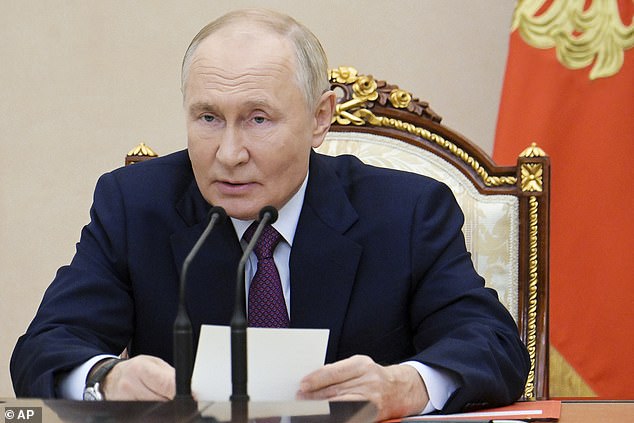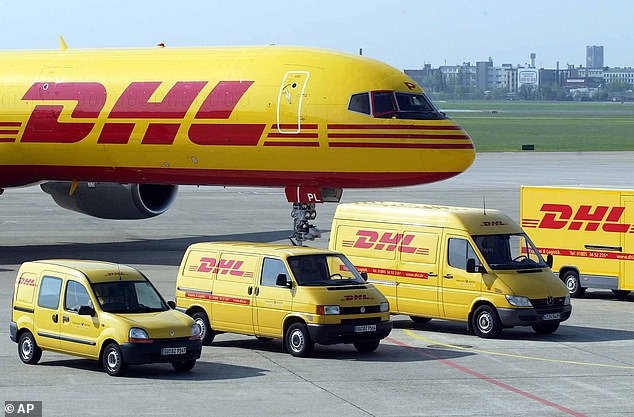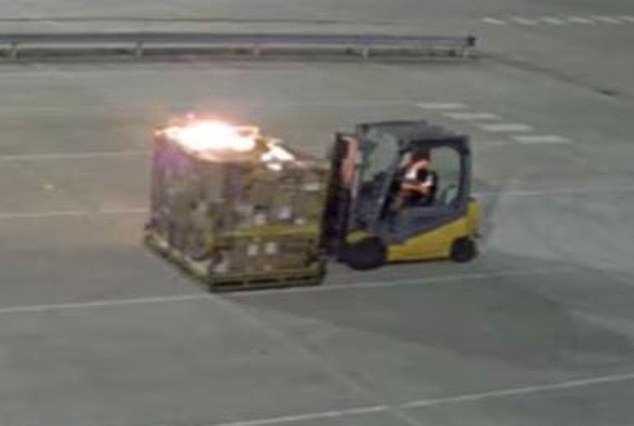An alleged Russian plot to attack US-bound flights with explosive sex toys could lead to an all-out war between NATO and Russia, an expert has warned.
Two incendiary devices were ignited in British and German DHL warehouses in July after being reportedly hidden among erotic gadgets and sex toys.
While no one was injured in the fires, authorities warned that the planes could have been shot down if the explosives ignited in mid-flight.
In Birmingham, the package exploded hours after being loaded onto a plane, while in Germany the package caught fire on the ground during a flight delay.
Western officials fear the incidents were evidence of a plot to attack flights bound for the United States, a move they say would be a major escalation, especially if it resulted in a mass casualty event.
Dr Samuel Ramani, an expert at leading defense and security think tank RUSI, has now told MailOnline that “bomb plots” could lead to a “full confrontation” if the West retaliates.
On July 22, two incendiary devices were shipped through a DHL fulfillment center to Birmingham, England, and Leipzig, Germany, causing a fire.

The alleged suspect is captured on security camera images.

Massage pillows and other erotic items were reportedly found in a shipment concealing incendiary devices that were later detonated in British and German DHL warehouses.
“If the West comes together and takes the threat seriously, Russia could end up losing from this,” he said.
“The irony is that the Russians could end up getting something they don’t want in exchange for the attacks.
‘They could see NATO countries increase their arms supplies to Ukraine and allow them to fire missiles towards Russia.
‘It’s probably something that could trigger an all-out confrontation, but it would probably be limited to Ukraine.
“It could absolutely escalate the confrontation, but within the parameters already established.”
He said what Russia is doing is a “form of terrorism” and that the packages were a response to Britain’s approval of the use of Storm Shadow missiles in Ukraine.
And when asked if people should fear the threat posed by Russia, Dr Ramani said: “Yes, people should be very alert; they should not take the threat any less seriously than ISIS or any other terrorist group.”
“They are terrorists in the same way, with very serious intentions, strategic actions, not just dishonest action, criminals for hire, this is a state-sponsored operation.”
Four people have been arrested in Poland in connection with a warehouse fire in July.
They have been accused of participating in sabotage or terrorist operations on behalf of a foreign intelligence agency.

Russian President Vladimir Putin speaks at the Security Council meeting on nuclear deterrence at the Kremlin in Moscow, Russia, on September 25.

Polish reports claimed that two incendiary devices that were shipped through a DHL fulfillment center were hidden among a package of “erotic items and massage pillows.”
Sources have suggested that the package that was ignited in Leipzig was also destined for the UK, but it remains unclear why the UK was the chosen destination for the two devices, originally sent from Lithuania.
Images published by the Wall Street Journal, provided by an anonymous European security official, appear to show the massage pillows, the suspects and the moment of the explosion.
So far, UK counter-terrorism police have only confirmed that one device caught fire in Birmingham and that it was attended to “by local staff and firefighters at the time”.
But researchers have said there could have been much more serious consequences if the camouflaged devices had ignited during flight.
The Polish prosecutor’s office stated: “The group’s goal was also to test the transfer channel for such packages, which would ultimately be sent to the United States of America and Canada.”
The head of Poland’s foreign intelligence agency, Pawel Szota, also blamed Russia, although the prosecutor’s statement did not name any foreign governments suspected of directing the operations.
British police and officials, as well as their European counterparts in Germany, Poland and Lithuania, also strongly suspect that Russia was behind the attacks as part of an effort to cause “chaos” in retaliation for Western military support for Ukraine.
But Russia has denied involvement in the alleged plot.
“These are traditional baseless insinuations by the media,” Kremlin spokesman Dmitry Peskov told the WSJ.

The head of the German intelligence service, Thomas Haldenwang, previously warned of an increase in “aggressive behavior” from Moscow.

Counter-terrorism police are investigating whether Russia was behind an incendiary device which burst into flames at this DHL hub in Minworth, Birmingham (pictured)
Concerns about suspected Russian involvement have arisen as Western officials increasingly fear the country could be responsible for similar acts of sabotage.
German intelligence chief Thomas Haldenwang previously said Russian “aggression” was “putting people’s lives at risk” as well as affecting “all areas of our free society.”
Foreign intelligence chief Bruno Kahl added that Putin is likely to “further test the West’s red lines” amid rising tensions between Russia and NATO over the invasion of Ukraine.
He said there was now a willingness at a “previously unknown level” to attempt sabotage from the Kremlin.
A warehouse in London belonging to a company with links to Ukraine caught fire in an alleged deliberate attack in March.
Meanwhile, in Germany, a military base was the target of an alleged attempt to contaminate its drinking water in August.
US intelligence also uncovered a plot to assassinate Armin Papperger, CEO of arms maker Rheinmetall, which has supplied vehicles and ammunition to Ukraine.
And Russia was accused by Polish Prime Minister Donald Tusk of being behind a fire at a shopping center in Warsaw.


